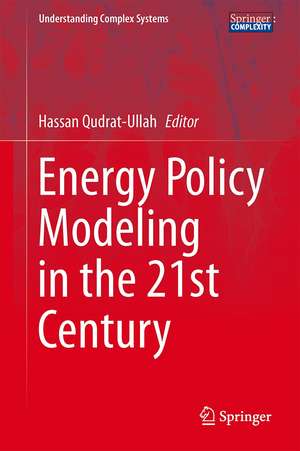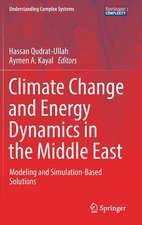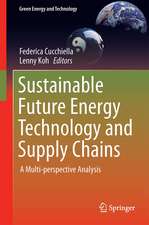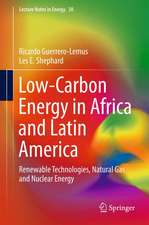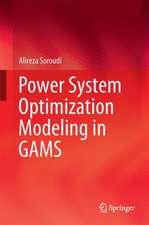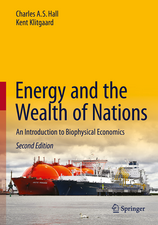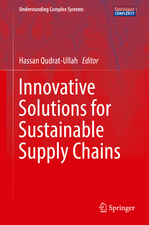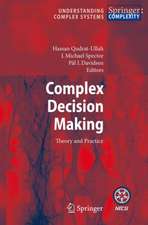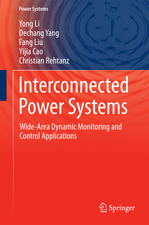Energy Policy Modeling in the 21st Century: Understanding Complex Systems
Editat de Hassan Qudrat-Ullahen Limba Engleză Hardback – 3 oct 2013
The use of model-based analysis and scenarios in energy policy design and assessment has seen phenomenal growth during the past several decades. In recent years, renewed concerns about climate change and energy security have posed unique modeling challenges. By utilizing the validation techniques and procedures which are effectively demonstrated in these contributions, researchers and practitioners in energy systems domain can increase the appeal and acceptance of their policy models.
| Toate formatele și edițiile | Preț | Express |
|---|---|---|
| Paperback (1) | 640.06 lei 6-8 săpt. | |
| Springer – 23 aug 2016 | 640.06 lei 6-8 săpt. | |
| Hardback (1) | 646.62 lei 6-8 săpt. | |
| Springer – 3 oct 2013 | 646.62 lei 6-8 săpt. |
Din seria Understanding Complex Systems
- 18%
 Preț: 1112.30 lei
Preț: 1112.30 lei -
 Preț: 439.25 lei
Preț: 439.25 lei - 18%
 Preț: 1119.38 lei
Preț: 1119.38 lei - 15%
 Preț: 401.82 lei
Preț: 401.82 lei - 18%
 Preț: 1247.26 lei
Preț: 1247.26 lei - 15%
 Preț: 641.20 lei
Preț: 641.20 lei - 15%
 Preț: 642.68 lei
Preț: 642.68 lei - 15%
 Preț: 651.51 lei
Preț: 651.51 lei - 18%
 Preț: 946.55 lei
Preț: 946.55 lei - 18%
 Preț: 947.98 lei
Preț: 947.98 lei - 20%
 Preț: 650.27 lei
Preț: 650.27 lei - 18%
 Preț: 952.09 lei
Preț: 952.09 lei - 18%
 Preț: 957.13 lei
Preț: 957.13 lei - 18%
 Preț: 943.88 lei
Preț: 943.88 lei -
 Preț: 398.35 lei
Preț: 398.35 lei - 5%
 Preț: 1417.54 lei
Preț: 1417.54 lei - 15%
 Preț: 648.42 lei
Preț: 648.42 lei -
 Preț: 387.75 lei
Preț: 387.75 lei - 18%
 Preț: 1133.76 lei
Preț: 1133.76 lei - 18%
 Preț: 948.16 lei
Preț: 948.16 lei - 20%
 Preț: 655.85 lei
Preț: 655.85 lei - 18%
 Preț: 1113.09 lei
Preț: 1113.09 lei - 20%
 Preț: 655.53 lei
Preț: 655.53 lei - 15%
 Preț: 653.00 lei
Preț: 653.00 lei - 18%
 Preț: 1332.92 lei
Preț: 1332.92 lei - 18%
 Preț: 1010.48 lei
Preț: 1010.48 lei - 18%
 Preț: 955.56 lei
Preț: 955.56 lei -
 Preț: 384.22 lei
Preț: 384.22 lei - 18%
 Preț: 950.66 lei
Preț: 950.66 lei - 15%
 Preț: 638.43 lei
Preț: 638.43 lei - 15%
 Preț: 644.49 lei
Preț: 644.49 lei - 15%
 Preț: 647.40 lei
Preț: 647.40 lei - 15%
 Preț: 649.06 lei
Preț: 649.06 lei - 15%
 Preț: 639.25 lei
Preț: 639.25 lei - 15%
 Preț: 643.65 lei
Preț: 643.65 lei - 18%
 Preț: 960.78 lei
Preț: 960.78 lei - 15%
 Preț: 649.87 lei
Preț: 649.87 lei - 15%
 Preț: 645.47 lei
Preț: 645.47 lei
Preț: 646.62 lei
Preț vechi: 760.73 lei
-15% Nou
Puncte Express: 970
Preț estimativ în valută:
123.74€ • 134.37$ • 103.95£
123.74€ • 134.37$ • 103.95£
Carte tipărită la comandă
Livrare economică 22 aprilie-06 mai
Preluare comenzi: 021 569.72.76
Specificații
ISBN-13: 9781461486053
ISBN-10: 146148605X
Pagini: 288
Ilustrații: XIII, 273 p. 107 illus., 77 illus. in color.
Dimensiuni: 155 x 235 x 21 mm
Greutate: 0.59 kg
Ediția:2013
Editura: Springer
Colecția Springer
Seria Understanding Complex Systems
Locul publicării:New York, NY, United States
ISBN-10: 146148605X
Pagini: 288
Ilustrații: XIII, 273 p. 107 illus., 77 illus. in color.
Dimensiuni: 155 x 235 x 21 mm
Greutate: 0.59 kg
Ediția:2013
Editura: Springer
Colecția Springer
Seria Understanding Complex Systems
Locul publicării:New York, NY, United States
Public țintă
ResearchCuprins
Part I - Energy Policy Modeling in 21st Century: An Introduction.- Chapter 1 - Energy Policy Modeling in the 21st Century: An Introduction.- Part II - Modeling Approaches and Energy Policy Decisions.- Chapter 2 - Thinking about the Future: System Dynamics and the process of electricity deregulation.- Chapter 3 - Fuzzy System Dynamics: A Framework for Modeling Renewable Energy Policies.- Chapter 4 - The Diffusion of Eco-Technologies: A Model-Based Theory.- Chapter 5 - Managing the Energy Basket in the Face of Limits: A search for operational means to sustain energy supply and contain its environmental impact.- Chapter 6 - Power Plant Relocation Policy versus Investments in Transmission Network Infrastructure: A Study on the Italian Energy Market.- Chapter 7 - Simulation of Greenhouse Gas Cap-and-Trade Systems with ENERGY 2020.- Part III - System Dynamics and Agent-Based Models in Action.- Chapter 8 - Energy Policy Planning for Climate-Resilient Low-Carbon Development.- Chapter 9 - Understanding the Dynamics of Electricity Supply and Demand in Canada.- Chapter 10 - Adoption of Renewable Energy Technologies: A Fuzzy System Dynamics Perspective.- Chapter 11 - Resurrecting a Forgotten Model: Updating Mashayekhi’s Model of Iranian Economic Development.- Chapter 12 - Making Progress Towards Emissions Mitigation: Modeling Low-carbon Power Generation Policy.- Chapter 13 - Exploring Energy and Economic Futures using Agent-based Modeling and Scenario Discovery.
Textul de pe ultima copertă
The roles and applications of various modeling approaches, aimed at improving the usefulness of energy policy models in public decision making, are covered by this book. The development, validation, and applications of system dynamics and agent-based models in service of energy policy design and assessment in the 21st century is a key focus. A number of modeling approaches and models for energy policy, with a particular focus on low-carbon economic development of regions and states are covered. Chapters on system dynamics methodology, model-based theory, fuzzy system dynamics frame-work, and optimization modeling approach are presented, along with several chapters on future research opportunities for the energy policy modeling community.
The use of model-based analysis and scenarios in energy policy design and assessment has seen phenomenal growth during the past several decades. In recent years, renewed concerns about climate change and energy security have posed unique modeling challenges. By utilizing the validation techniques and procedures which are effectively demonstrated in these contributions, researchers and practitioners in energy systems domain can increase the appeal and acceptance of their policy models.
The use of model-based analysis and scenarios in energy policy design and assessment has seen phenomenal growth during the past several decades. In recent years, renewed concerns about climate change and energy security have posed unique modeling challenges. By utilizing the validation techniques and procedures which are effectively demonstrated in these contributions, researchers and practitioners in energy systems domain can increase the appeal and acceptance of their policy models.
Caracteristici
Outlines how modeling applications work and improve energy policy in public decision making Novel approach to energy policy modeling from a systems and agent-based approach Provides several different examples of modeling approaches as well as models Includes supplementary material: sn.pub/extras
